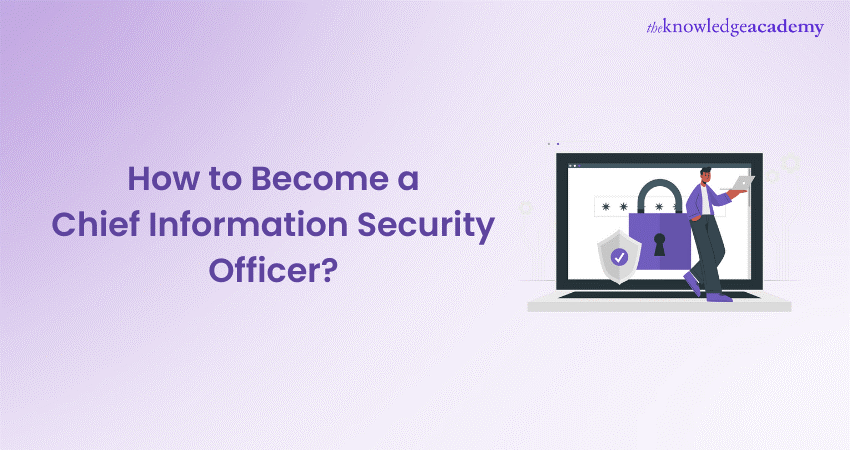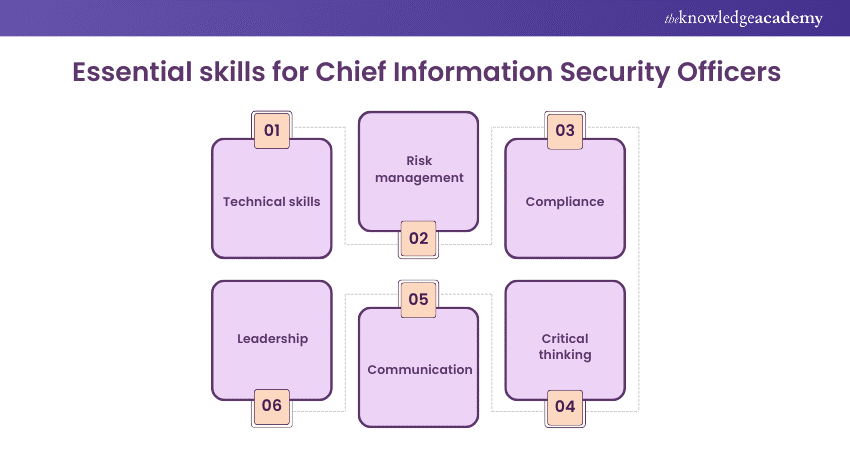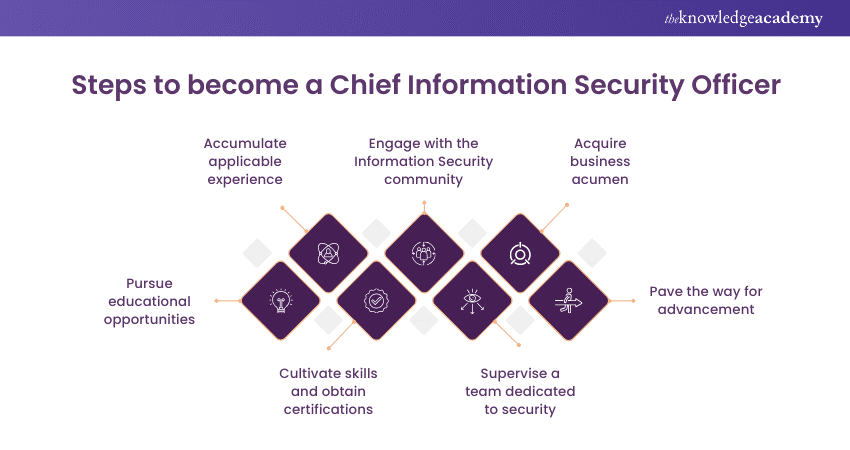We may not have the course you’re looking for. If you enquire or give us a call on +44 1344 203 999 and speak to our training experts, we may still be able to help with your training requirements.
Training Outcomes Within Your Budget!
We ensure quality, budget-alignment, and timely delivery by our expert instructors.

Since many years, the query like- “How to Become a Chief Information Security Officer?” has gained immense popularity. As an increasingly complex field, the CISO position demands a unique combination of technical proficiency, leadership skills and strategic thinking.
There might be an increasing demand for Chief Information Security Officer. Essentially, when the employment rate of Computer and Information Systems’ Managers might grow by 15% from 2022 to 2032.
To better embark on the journey of becoming a Chief Information Security Officer, you can read our blog. Regardless of your experience-level, this blog can help you discover the skills needed to carve a booming career in cybersecurity.
Table of Contents
1) Who is a Chief Information Security Officer?
2) Responsibilities of a Chief Information Security Officer
3) Steps to become a Chief Information Security Officer
4) Essential skills for Chief Information Security Officers
5) Conclusion
Who is a Chief Information Security Officer?
A Chief Information Security Officer (CISO) is a top-level executive, who oversees the security of an organisation's systems and data. They primarily safeguard a company’s data from fraud, breaches as well as security threats.
Their tasks further include managing a team of Information Security and Cybersecurity working professionals. They primarily report to a company’s Chief Executive Officer (CEO) and collaborate with the Chief Information Officer (CIO).
Responsibilities of a Chief Information Security Officer
A CISO’s role holds a high value in any organisation. This is because of their ability to build strategies for securing financial records and intellectual property of organisations. In addition, their responsibilities include the following points:
a) Making sure that only authorised employees access certain data systems
b) Resolve security breaches and respond on time
c) Develop a secure system and processes
d) Progress tools and automated processes to safeguard data
e) Figure out potential security threats and design programmes to prevent them
f) Hire, train and manage Information Technology and security employees
g) Teach employees about Information Security practices and policies
h) Coming up with Software Security installation and upgrade decisions
i) Investigating the outcomes of security breaches
Join our CISSP Training to grasp the strategies of security systems- join us now!
Steps to become a Chief Information Security Officer
The Chief Information Security Officers’ job require immense efforts. However, following the below steps can help you to explore this profession:
1) Pursue educational opportunities
Most of the employers require CISO experts to hold at least a Bachelor’s in Computer Science, Cybersecurity, Information Technology or in relevant areas. Such courses strengthen your foundation in technology, programming, and computer skills. Further advanced degrees can also assist you with the managerial aspects of the role.
2) Accumulate applicable experience
The Chief Information Security Officers should hold an adequate professional expertise. Thus, you must take up entry-level jobs in Computer Programming, Networking Analysis, or System Analysis following your UG degree. Through these jobs, you can better identify, invest, and prevent Information Security threats.
3) Cultivate skills and obtain certifications
You might be aware of the handful Information Security Certifications which strengthens your knowledge and skills. Those certifications, however, highlight your dedication towards career besides impressing employers. Depending on your requirements and expertise level, those certifications might vary.
4) Engage with the Information Security community
An essential step to becoming a Chief Information Security Officer is getting involved in the Information Security Community. Through this, you can build connections and foster a stronger cybersecurity community. For the best outcomes, you can primarily join professional organisations, attend conferences, and network with other CISOs.
5) Supervise a team dedicated to security
Above all, you should hold experience in overseeing a security team. This means that you should direct a team which monitors the network for any suspicious activity. Administering such teams might better equip you with the security policies and outlined procedures.
6) Acquire business acumen
Having a strong understanding of business operations and objectives is imperative to become a successful CISO. Hence, you must familiarise yourself with strategic management, regulatory compliance and corporate governance. Gaining insights into your industry further allows you to effectively align security initiatives with entire business objectives.
7) Pave the way for advancement
While progressing in the Chief Information Security Officer career, you must seek opportunities to distinguish yourself as a subject-matter expert. To establish this reputation, you can publish research journals, and contribute to industry publications. A commitment to constant learning can showcase your dedication to personal growth.
Upgrade your skills and gain expertise with our CISSP Certification Course
Essential skills for Chief Information Security Officers
Like every other profession, Chief Information Security Officers require advanced skills for long-term survival. Some of those skills to boost your job resume are as follows:

a) Technical skills: As a CISO, you should adequately understand complex information technology networks and operations. For this, you must hold technical abilities like mobile device management, database security and management, firewall management, security architecture, etc.
b) Risk management: To become a potential CISO, you should identify potential security risks associated with partners, employers, vendors, IT tools, etc. Additionally, you should have an in-depth understanding of those risks and ways to reduce or prevent them.
c) Compliance: Becoming a CISO also require you to ensure that your organisations remain in compliance. Hence, you should always stay updated on industry regulations.
d) Critical thinking: A CISO’s duties include coming up with the best solutions as per the situation. Consequently, this profession demands your critical thinking skills to identify the concerns and solve them.
e) Communication: The CISO profession requires your collaboration with other executives, managers, developers and interested parties to attain their security goals. To meet this requirement, you must effectively communicate about complex technology and deliver well-organised presentations.
f) Leadership: As a potential Chief Information Security Officer, you must be able to effectively guide technical teams. Essentially, you should instruct the team and retain their confidence when security breaches occur.
Conclusion
While the journey of how to become a Chief Information Security Officer is demanding, it is an attainable goal. From our blog, we hope you can implement the correct mix of technical expertise, and business acumen to become an efficient CISO.
Build an indispensable career with our CISSP-ISSAP Training & Certification- register today!
Frequently Asked Questions

The required time-duration to become a CISO entirely depends on individual. However, following the correct route and strategies can make their roadway much smooth and easier.

Turning into a CISO calls for following and clinging to certain steps. However, having a relevant educational background and gaining expertise are among the crucial factors to enter this profession.

The Knowledge Academy takes global learning to new heights, offering over 30,000 online courses across 490+ locations in 220 countries. This expansive reach ensures accessibility and convenience for learners worldwide.
Alongside our diverse Online Course Catalogue, encompassing 17 major categories, we go the extra mile by providing a plethora of free educational Online Resources like News updates, Blogs, videos, webinars, and interview questions. Tailoring learning experiences further, professionals can maximise value with customisable Course Bundles of TKA.

The Knowledge Academy’s Knowledge Pass, a prepaid voucher, adds another layer of flexibility, allowing course bookings over a 12-month period. Join us on a journey where education knows no bounds.

The Knowledge Academy offers various CISSP Training, including CISSP Certification Course, CISSP-ISSAP Training & Certification, and Information Systems Security Management Training. These courses cater to different skill levels, providing comprehensive insights into CCSP vs CISSP.
Our IT Security & Data Protection Blogs cover a range of topics related to CISSP, offering valuable resources, best practices, and industry insights. Whether you are a beginner or looking to advance your IT Security & Data Protection skills, The Knowledge Academy's diverse courses and informative blogs have you covered.
Upcoming Health & Safety Resources Batches & Dates
Date
 CISSP Certification
CISSP Certification
Mon 13th Jan 2025
Mon 10th Feb 2025
Mon 10th Mar 2025
Mon 7th Apr 2025
Mon 12th May 2025
Mon 9th Jun 2025
Mon 14th Jul 2025
Mon 11th Aug 2025
Mon 8th Sep 2025
Mon 13th Oct 2025
Mon 10th Nov 2025
Mon 8th Dec 2025







 Top Rated Course
Top Rated Course




 If you wish to make any changes to your course, please
If you wish to make any changes to your course, please


